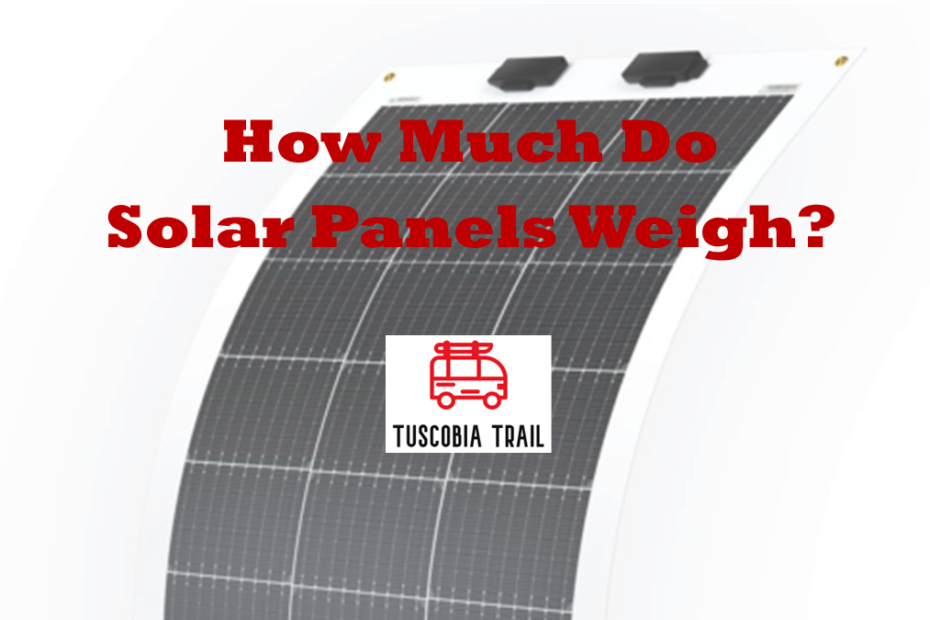When considering solar panels for your RV, there are several important factors to consider, including cost and efficiency. Knowing how much do solar panels weigh is probably the most important.
The weight of solar panels can significantly affect your RV’s performance and capacity – particularly if you a limited by overall weight of your campervan.
It’s crucial to choose the right type of solar panel and from our experience of adding them to our van, we can share our research into the weight of different types of solar panels and their implications for RV use.
Types of RV Solar Panels
RV solar panels come in various styles and sizes, with weights ranging from as little as 5 pounds to as much as 60 pounds.
The main types of RV solar panels are amorphous, polycrystalline, and monocrystalline, each with distinct characteristics.
Amorphous Solar Panels
Amorphous solar panels are made from thin layers of photovoltaic material such as glass, metal, or plastic. These panels are very lightweight, typically between 5 and 15 pounds.
Their flexibility allows them to conform to curved surfaces, making them a popular choice for RV roofs.
They require a larger surface area and must be permanently installed with adhesive, making them less versatile in terms of placement.
Additionally, amorphous panels tend to be the most expensive, with individual panels costing upwards of $300.
Polycrystalline Solar Panels
Polycrystalline solar panels are easily recognizable by their distinctive cobalt blue color. They are made from multiple silicon crystals, making them less efficient but more affordable than other types.
Polycrystalline panels are heavier, ranging from 35 to 60 pounds. Despite their weight, they are a cost-effective option, with complete solar panel kits starting around $500.
Their affordability makes them a common choice for many RV owners, but the added weight needs careful consideration.
Monocrystalline Solar Panels
Monocrystalline panels are considered the middle ground in terms of weight, cost, and efficiency.
They weigh between 30 and 50 pounds and are generally more efficient than polycrystalline panels but less expensive than amorphous panels.
These panels can be found in both rigid and somewhat flexible forms, providing more installation options. Their cost varies widely, typically between $350 and $850 for a kit.
Flexible vs Non-Flexible Solar Panels
The flexibility of solar panels is another important factor. Flexible panels are usually made with plastic instead of glass, making them lighter and more adaptable to curved surfaces.
These panels do not require screws for mounting and can be attached with adhesive. However, flexible panels are more expensive and can overheat more easily due to the lack of airflow beneath them.
Rigid panels, on the other hand, offer better cooling and are generally more affordable. They are heavier and require secure mounting, which can add to the overall weight and installation complexity.
Why Weight Matters
The weight of your RV solar panels is crucial because it directly impacts your vehicle’s Unloaded Vehicle Weight (UVW). The UVW is the manufacturer-recommended maximum weight that your RV should carry.
Exceeding this weight can lead to poor fuel efficiency, handling issues, and increased risk of accidents, especially when taking sharp corners.
For instance, choosing heavier polycrystalline panels might save you money upfront but could limit the additional cargo you can carry, such as a car or boat.
On the other hand, lighter amorphous panels allow for more flexibility in your total load but come at a higher cost.
When selecting solar panels for your RV, consider both the immediate and long-term impacts of their weight. Ensuring your RV stays within its recommended weight limits will enhance your travel experience, safety, and efficiency.
FAQs
How much do typical RV solar panels weigh?
The weight of RV solar panels can vary depending on their size and type. A standard 100W rigid solar panel typically weighs around 7-9 kg (15-20 lbs). Larger 200W panels may weigh approximately 11-12 kg (24-26 lbs).
Are flexible solar panels lighter than rigid panels?
Yes, flexible solar panels are generally lighter than rigid panels of the same wattage. For example, a 200W flexible solar panel kit can weigh as little as 4.5 kg (10 lbs), making it significantly lighter than rigid alternatives.
How much weight can an RV or campervan roof typically support?
Most RV and campervan roofs can safely support the weight of solar panels. However, it’s important to consider the cumulative weight of all roof-mounted equipment. A typical 100W panel weighing 9 kg (20 lbs) should not pose a problem for most vehicle roofs.
Do I need to reinforce my RV roof to install solar panels?
In most cases, reinforcement is not necessary for installing a standard solar panel setup. However, if you’re planning to install multiple large panels or have concerns about your specific vehicle’s roof strength, it’s best to consult with a professional installer or the vehicle manufacturer.
How does the weight of solar panels affect fuel efficiency?
The weight added by solar panels is generally minimal compared to the overall weight of an RV or campervan.
While there may be a slight impact on fuel efficiency, it’s usually negligible. The energy savings provided by the solar panels often outweigh any minor decrease in fuel efficiency.
Are semi-flexible panels a good option for weight-conscious RV owners?
Yes, semi-flexible panels are an excellent choice for those concerned about weight. They offer a good balance between durability and light weight, making them suitable for pop-top roofs and vehicles where minimizing additional weight is important.
Remember to always check the specifications of the specific solar panels you’re considering, as weights can vary between manufacturers and models.
